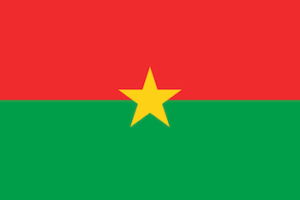
*On this date in 1960, Burkina Faso gained independence from France.
Starting in the early 1890s, during the white-European Berlin Conference, many white military officers attempted to claim parts of what is today Burkina Faso. These colonialists and their armies fought the local peoples; sometimes, they forged alliances with them and made treaties. The colonialist officers and their home governments also made treaties amongst themselves. The territory of Burkina Faso was invaded by France, becoming a French protectorate in 1896.
The eastern and western regions, where a standoff against the forces of the powerful ruler Samori Ture complicated the situation, came under French occupation in 1897. By 1898, most of the territory that corresponds to Burkina Faso had been conquered. French control of many parts remained uncertain. The Franco-British Convention of June 14, 1898, created the country's modern borders. A war of conquest against local communities and political powers continued for about five years in the French territory. In 1904, the colony had its capital in Bamako.
The language of colonial administration and schooling became French. The indigenous population was oppressed. African children were not allowed to ride bicycles or pick fruit from trees, "privileges" reserved for the children of white colonists. Violating these regulations could land parents in jail. Draftees from the territory participated in the European fronts of World War I in the battalions of the Senegalese Rifles. Between 1915 and 1916, the districts in the western part of what is now Burkina Faso and the bordering eastern fringe of Mali became the stage of one of the most critical armed oppositions to colonial government: the Volta-Bani War. The French government finally suppressed the movement, but only after suffering defeats. It also had to organize the most significant expeditionary force in its colonial history to send into the country to suppress the insurrection.
Armed opposition erupted in the Sahelian north when the Tuareg and allied groups from the Dori region ended their truce with the government. French Upper Volta was established in March 1919. The French feared a recurrence of armed uprisings, as well as related economic considerations. To bolster its administration, the colonial government separated the present territory of Burkina Faso from Upper Senegal and Niger. The new colony was named Haute Volta for its location on the upper courses of the Volta River, and François Charles Alexis Édouard Hesling became its first governor. Hesling initiated an ambitious road-making program to improve infrastructure and promote cotton's growth for export.
The cotton policy based on coercion failed, and the revenue generated by the colony stagnated. The colony was split in September 1932 between the French colonies of the Ivory Coast, French Sudan, and Niger. Ivory Coast received the largest share, which contained most of the population, and the cities of Ouagadougou and Bobo-Dioulasso. A revision in the organization of French Overseas Territories began with the passage of the Basic Law (Loi Cadre) of July 23, 1956.
The French parliament reorganized and approved this act early in 1957 to ensure a significant degree of self-government for individual territories. On December 11, 1958, the colony achieved self-government as the Republic of Upper Volta; it joined the Franco-African Community. Complete independence from France was achieved in 1960.